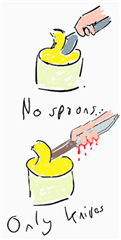So, I'm a big fan of Spoon Theory but I feel it is quite forgettable as non-spoonies can't connect with the full consequences on a personal level. And I need to find an effective way to help family, 'friends' and any future employers/colleagues understand why, when I recover from my latest burnout, I won't be picking up from where I left off with my high-octane career.
Enter Beer Theory (well, that's what I'm calling it for now, but it works with wine, shots or whatever). With Beer Theory, you ask the non-spoonie what their alcohol limit is; y'know, the number of pints at which they know they'll probably throw up and pass out on the floor. This is their limit that, when reached, they are no longer able to function. (Can you see where I'm going with this?) Okay, let's say your non-spoonie friend says their limit is ten pints of beer: they know if they go out and drink ten pints of beer tonight, they won't be doing anything tomorrow except mopping up vomit when they finally regain consciousness sometime after noon.
You: "Okay, so if you only drink nine and a half pints, then you'll be fine?"
Them: "Yeah, give or take, I should be fine."
You: "Great, if you drink nine and a half pints each day, then you can continue to function as normal with no ill effects?"
Them: "Well, no, I couldn't drink that much every day."
You: "Why not? It's below your limit?"
Them: "Yes, but the cumulative effect wouldn't be good."
You: "Okay, so how many pints could you drink sustainably?"
Them: "I dunno, maybe two or three."
You: "Is that all? That's significantly less than your limit."
Them: "Yes, but to do it every day and to function with no ill effects, it would have to be. Besides, I probably wouldn't drink every day anyway."
You: "What do you mean you probably wouldn't drink every day? If you can do it without any ill effects, why not?"
Them: "Well, it's not good for you to be drinking every day, and over time it probably would make me ill."
You: "Hmm. So how many days a week could you drink two or three pints with no ill effects long-term?"
Them: "I dunno. Maybe two or three days a week."
You: "Is that all? Hmm. Okay, so despite the fact you can drink nine and a half pints in a night and function as normal the following day, you're only able to drink two to three pints a day, two to three days a week if you want to continue functioning in all other areas of your life long-term?"
Them: "Er, yeah. So what?"
You: "So, what you've basically described is the equivalent of me doing a menial job on part-time hours."
Them: <Stunned silence>
You: "And just like when you get cajoled into having a couple of extra pints or going out a couple of extra nights a week other areas of your life start to suffer, so too when I get asked to stay on an extra hour or work an extra day, I'm then not able to function in other areas of my life."
QED.
What do you reckon? Does it work as an analogy that non-spoonies will understand?
Edit: I think it works on an additional level where spoons don't because the more someone drinks, the more their communication, coordination, memory, mental processing etc. becomes impaired, just like it does with us and our overexposure to stimuli etc.



